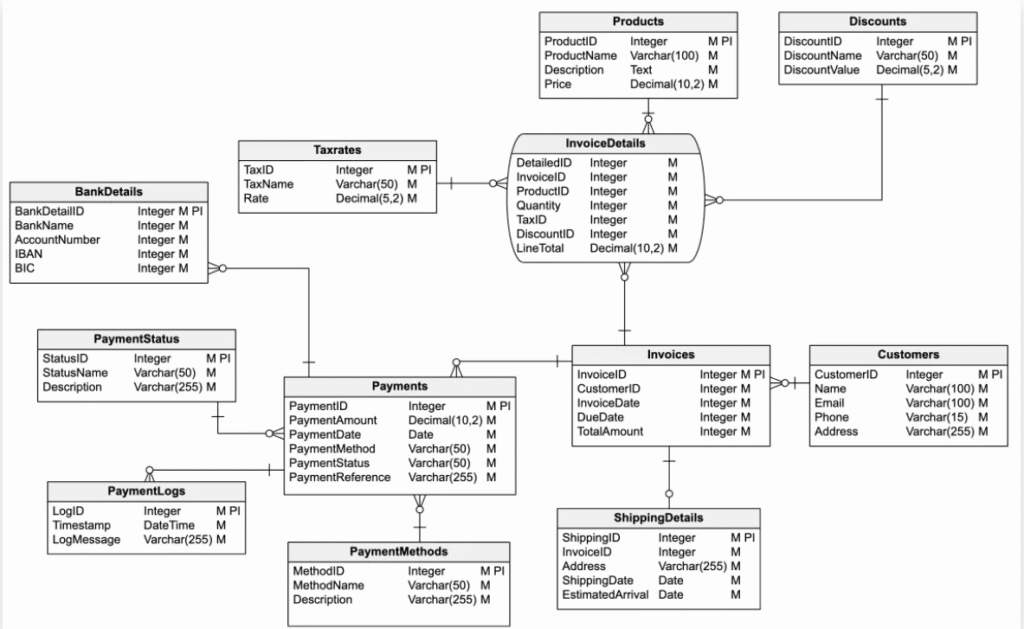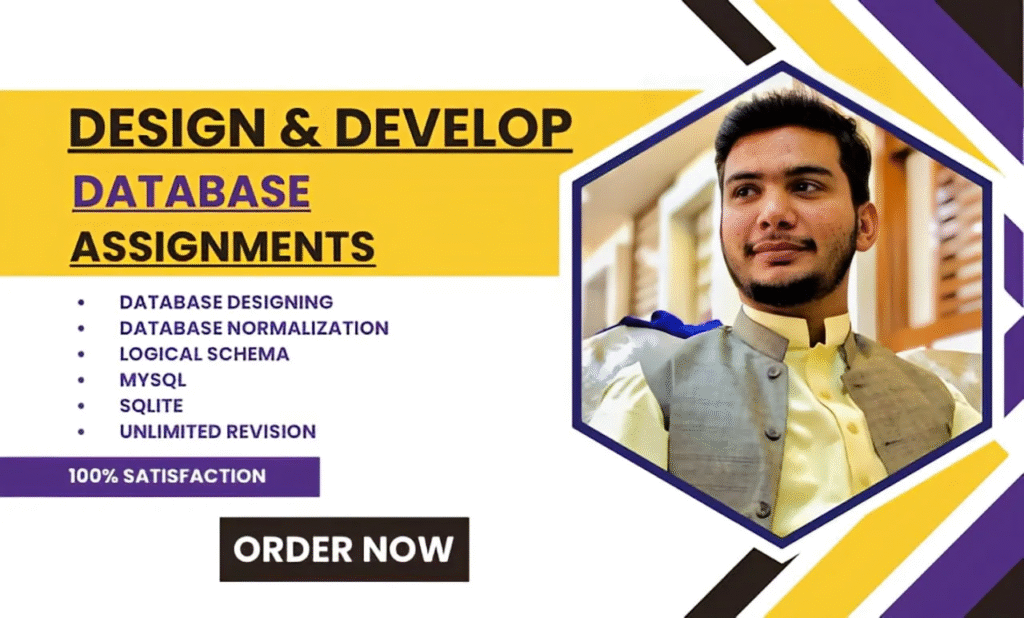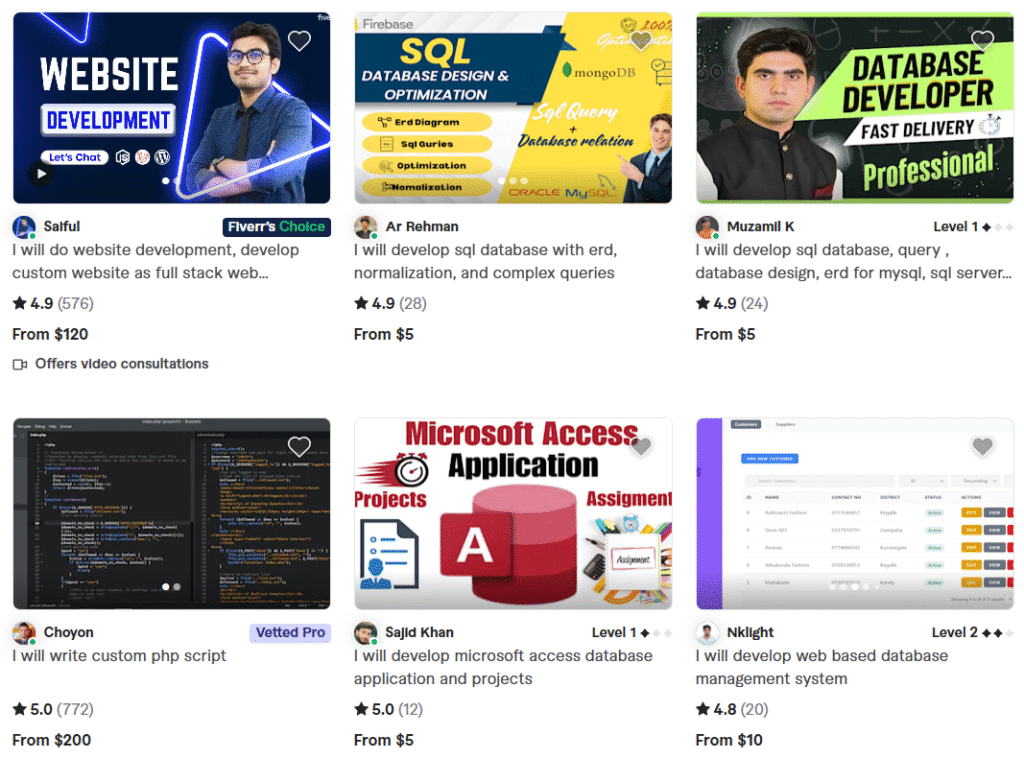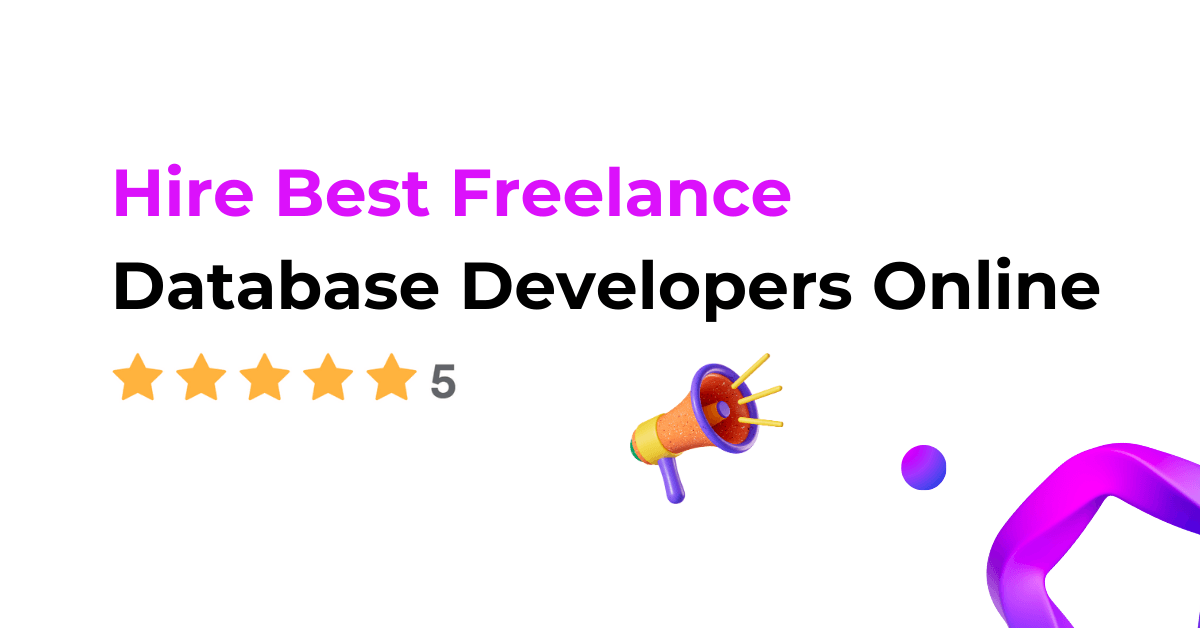In today’s data-driven world, every business—whether a startup, small company, or global enterprise—relies heavily on databases to store, organize, and secure valuable information. From managing customer records to analyzing business performance, databases play a critical role in decision-making and overall growth. However, building and maintaining these systems requires specialized expertise, which is why many businesses turn to freelance database developers.
Hiring a freelance database developer online offers flexibility, cost-effectiveness, and access to skilled professionals from around the globe. Instead of committing to expensive full-time hires, you can collaborate with experienced freelancers who bring the right technical knowledge to your project—whether it involves SQL, NoSQL, MySQL, MongoDB, PostgreSQL, or cloud-based databases.
This blog will guide you through everything you need to know about hiring the best freelance database developers online. From understanding their role and essential skills to exploring trusted platforms like Fiverr, Upwork, and Toptal, you’ll discover how to find the right expert who can optimize your database systems and help your business thrive.
Table of Contents
1. What Does a Freelance Database Developer Do?

A freelance database developer is a professional who specializes in designing, building, and maintaining databases for businesses, but works on a project or contract basis instead of being a full-time employee. Their primary responsibility is to ensure that your company’s data is stored, organized, and retrieved efficiently and securely.
Freelance database developers often work with a wide range of database systems depending on the project requirements. Some of the most common ones include:
- SQL Databases – MySQL, PostgreSQL, Microsoft SQL Server
- NoSQL Databases – MongoDB, Cassandra, Firebase
- Enterprise Databases – Oracle, IBM Db2
- Cloud Databases – Amazon RDS, Google Cloud SQL, Azure SQL
Their tasks go beyond just storing data. A skilled freelance database developer can:
- Design and structure databases that match the unique needs of a business.
- Write and optimize queries to ensure fast and accurate data retrieval.
- Implement data security measures to protect sensitive information from breaches.
- Integrate databases with applications, websites, or third-party tools.
- Perform troubleshooting and maintenance to fix errors and improve performance.
- Seamlessly transfer data from legacy systems to modern platforms with little to no downtime.
Unlike an in-house developer who is tied to one company, freelancers bring diverse experience from working on multiple projects across industries. This exposure allows them to quickly adapt to different business models, whether it’s e-commerce, healthcare, finance, or SaaS.
In short, a freelance database developer is your go-to expert for managing the backbone of your digital operations—your data. By hiring one online, you can gain access to top talent without the high cost of full-time employment.
2. Benefits of Hiring Freelance Database Developers Online

When it comes to managing business data, hiring a freelance database developer online offers flexibility and value that traditional hiring often cannot match. Below are the top advantages:
1. Cost-Effective Solution
Unlike full-time employees, you don’t need to cover overhead expenses such as office space, training, or employee benefits. You only pay for the work you need—whether it’s a one-time database setup, optimization, or ongoing maintenance.
2. Access to Global Talent Pool
By hiring online, you are not limited to local professionals. You can tap into a worldwide network of skilled database developers experienced in PostgreSQL, MySQL, MongoDB, or cloud-based systems like AWS and Azure. This global reach increases your chances of finding the exact expertise your project requires.
3. Flexibility and Scalability
Whether you’re launching a small e-commerce website that needs basic database setup or handling large-scale enterprise data migration, freelance developers can adapt to your requirements.
4. Faster Turnaround Time
Freelance database developers often work on project-based contracts, which motivates them to deliver results quickly and efficiently. With fewer bureaucratic hurdles compared to in-house teams, projects can be completed in shorter timeframes.
5. Specialized Skills for Specific Projects
Not all businesses need a full-time database administrator. Sometimes, you may only need an expert for database optimization, query performance tuning, or setting up data security protocols. Freelancers with niche expertise can be hired for exactly those tasks, saving both time and money.
3. Essential Skills to Look for in a Freelance Database Developer
When hiring a freelance database developer online, it’s important to evaluate not just their availability but also the skills and expertise they bring to the table. A strong skill set ensures your databases remain secure, efficient, and scalable for future growth. Below are the key skills to consider:
1. Proficiency in Database Languages and Tools
A professional database developer should be well-versed in SQL (Structured Query Language), as it forms the foundation of most database management systems. Beyond SQL, they should also have experience with NoSQL databases like MongoDB, Cassandra, or Firebase, which are essential for handling unstructured or high-volume data. Knowledge of tools like MySQL, PostgreSQL, and Oracle is a must for versatile projects.
2. Database Design and Architecture
Good database developers can design efficient and scalable database structures. They understand data modeling, normalization, indexing, and schema design, ensuring smooth data flow without redundancy or performance bottlenecks. A well-structured database prevents slow queries and ensures long-term usability.
3. Optimization and Performance Tuning
An experienced freelance database developer knows how to optimize queries, manage indexing, and reduce latency for faster performance. Businesses that rely on real-time data need developers who can fine-tune databases to handle large amounts of information without downtime or errors.
4. Data Security and Compliance Knowledge
The right developer should understand data encryption, backup strategies, and access control. They should also be familiar with compliance standards such as GDPR, HIPAA, or PCI DSS, depending on your industry. This ensures sensitive business data remains safe from unauthorized access.
5. Cloud Database Management
As more businesses migrate to the cloud, developers with experience in cloud platforms like AWS, Azure, and Google Cloud are in high demand. A freelance database developer skilled in cloud integration can set up, monitor, and scale databases effectively to match your business needs.
6. Problem-Solving and Troubleshooting Skills
Even the best-designed databases face occasional issues. A capable freelancer must be able to diagnose performance problems, debug errors, and implement quick fixes without disrupting ongoing business operations. Strong analytical thinking is a critical part of this skill set.
7. Communication and Collaboration
Since freelancers often work remotely, strong communication skills are crucial. The developer should be able to understand your project requirements, explain technical details in simple terms, and collaborate with other team members, like web developers or data analysts.
✅ By focusing on these essential skills when hiring, you increase your chances of finding a freelance database developer who not only meets your technical needs but also ensures long-term reliability and security for your business data.
4. Where to Hire Skilled Freelance Database Developers Online
Hiring the right freelance database developer can be challenging, but online platforms make it easier to find skilled professionals. Here are some of the best platforms to hire freelance database developers online:
1. Fiverr

Fiverr ranks among the top freelance marketplaces for finding cost-effective database experts. The platform provides a variety of services, including database design, performance optimization, migration, and issue resolution. Freelancers on Fiverr are categorized by levels, such as Level 1, Level 2, and Top Rated, which helps you choose based on experience and client feedback. You can also view portfolios, reviews, and pricing upfront, making it a transparent and flexible option for hiring.
2. Upwork
Upwork is a trusted platform for professional freelancers. It allows you to hire developers based on hourly rates or fixed-price contracts. You can browse profiles with detailed experience, client ratings, and skill endorsements. Upwork is ideal for long-term or complex database projects, as you can interview candidates, discuss project scope, and monitor progress through the platform.
3. Toptal
Toptal is a premium network of vetted freelance developers. Only the top 3% of applicants are accepted, ensuring high-quality professionals with verified expertise in database management. If your project requires advanced skills, complex architecture, or strict performance standards, Toptal is a reliable choice. While it is more expensive than Fiverr or Upwork, the quality and reliability are often worth the investment.
4. Freelancer.com
Freelancer.com provides access to a global pool of database developers. You can post your project, receive bids from freelancers, and choose the best match based on skills and budget. Freelancer.com is great for businesses looking for flexibility in hiring and competitive pricing. The platform also allows milestone payments, ensuring work is delivered progressively.
5. Guru & PeoplePerHour
These platforms are also excellent for finding database developers. Guru allows you to search by expertise, location, and hourly rate, while PeoplePerHour is ideal for smaller projects or short-term database tasks. Both platforms include client reviews, work history, and secure payment options, helping you make informed hiring decisions.
Pro Tip: Always check freelancer reviews, portfolio samples, and previous client feedback before hiring. Platforms like Fiverr and Upwork also offer communication tools to discuss project details, ensuring your database needs are fully understood before work begins.
5. How to Choose the Right Freelance Database Developer for Your Project
Choosing the right freelance database developer can make or break your project. Hiring someone without proper evaluation can lead to delays, increased costs, or poorly optimized databases. Here’s a step-by-step guide to help you make the best choice:
1. Define Your Project Requirements Clearly
Before searching for a developer, outline the scope of your project.
- Determine the type of database (SQL, NoSQL, cloud-based).
- Specify the scale of your project (small app, enterprise-level system, or data migration).
- Highlight any special requirements like performance optimization, security compliance, or reporting tools.
A clear project brief helps freelancers understand your needs and ensures they can deliver efficiently.
2. Check Portfolio and Previous Work
A developer’s portfolio provides insight into their experience and expertise. Look for:
- Projects similar to yours in scale and complexity.
- Experience with the specific database technology you require.
- Successful implementations, performance improvements, or problem-solving cases.
Freelancers with a strong, diverse portfolio usually adapt better to unique project needs.
3. Review Client Feedback and Ratings
Platforms like Fiverr, Upwork, and Toptal display reviews and ratings from previous clients. Pay attention to:
- Consistency in delivering quality work.
- Responsiveness and communication skills.
- How they handle challenges and deadlines.
- Earning strong feedback from multiple clients proves dependability and trustworthiness.
4. Assess Technical Expertise
Evaluate their technical knowledge with focused questions or small test tasks:
- Understanding of database design, normalization, and optimization.
- Ability to work with cloud databases like AWS RDS, Azure SQL, or Google Cloud.
- Knowledge of security standards and data backup solutions.
- A technically proficient freelancer ensures your database is efficient, scalable, and secure.
5. Communication and Collaboration
Effective communication is critical for remote freelance work. Check:
- Availability during your project timeline.
- Responsiveness to messages or queries.
- Ability to explain complex technical concepts clearly.
- A freelancer who communicates well minimizes misunderstandings and accelerates project delivery.
6. Evaluate Pricing vs Quality
While cost is important, it shouldn’t be the only factor:
- Compare hourly rates or project-based pricing with the freelancer’s experience.
- Avoid choosing the cheapest option if quality or expertise is compromised.
- Look for a balance between cost, skills, and reliability to get the best value.
By following these steps, you can confidently select a freelance database developer who aligns with your project goals, budget, and timeline. A careful selection process ensures your database is robust, secure, and optimized for performance.
6. Cost of Hiring Freelance Database Developers
Understanding the cost of hiring a freelance database developer is crucial for budgeting and ensuring you get the best value for your investment. Rates can vary significantly based on factors like experience, location, and the complexity of your project.
💰 Average Hourly Rates by Region
- United States: Freelance database developers in the U.S. earn an average of $53.12 per hour, with rates ranging from $43.51 to $60.10 depending on experience and location.
- Upwork Platform: On Upwork, database programmers typically charge between $21 and $55 per hour, with a median rate of $38.
- SQL Developers: For SQL developers on Upwork, hourly rates range from $18 to $40, with a median hourly rate of $25.
- Global Averages: Worldwide, freelance database administrators earn an average of $59 per hour, with top earners in the U.S. making up to $125 per hour.
🧠 Factors Influencing Rates
Several factors can impact the cost of hiring a freelance database developer:
- Experience Level: Junior developers may charge lower rates, while senior developers with specialized skills command higher fees.
- Project Complexity: Complex projects requiring advanced database design or optimization may incur higher costs.
- Location: Developers in regions with a higher cost of living, like North America and Western Europe, typically charge more than those in Eastern Europe or South Asia.
- Technology Stack: Expertise in specific technologies, such as Oracle, MongoDB, or cloud databases, can influence pricing.
📊 Cost Comparison by Region
| Region | Hourly Rate (USD) |
|---|---|
| United States | $53.12 |
| Upwork (Median) | $38 |
| SQL Developers | $25 |
| Global Average | $59 |
7. Mistakes to Avoid While Bringing Onboard a Freelance Database Developer
Bringing in a freelance database developer can greatly benefit your business, but poor hiring decisions may result in lost time, money, and productivity. Here are some common pitfalls to avoid:
1. Hiring Based Only on Price
While budget is important, choosing a developer solely because they offer the lowest rate can backfire. Low-cost freelancers may lack the necessary experience or technical skills, leading to subpar database performance or errors that cost more to fix in the long run.
2. Ignoring Experience with Specific Databases
Not all database developers have expertise in every type of database. For example, a developer skilled in MySQL might not be proficient in MongoDB or PostgreSQL. Always ensure the freelancer has hands-on experience with the database technology your project requires.
3. Lack of Clear Project Scope
Failing to define your project’s objectives, deadlines, and deliverables can cause confusion and delays. When the project scope is well-documented, freelancers gain clarity on requirements and can be held responsible for deliverables.
4. Overlooking Communication and Availability
Even highly skilled developers can create issues if they are difficult to reach or do not provide regular updates. Before hiring, discuss preferred communication channels, working hours, and reporting frequency to avoid misunderstandings.
5. Skipping Portfolio and References Check
Some businesses hire freelancers without checking their previous work or client feedback. This is risky because portfolios and reviews provide insight into a developer’s reliability, quality of work, and ability to handle projects similar to yours.
6. Not Considering Data Security Practices
Since database management deals with sensitive data, it’s crucial to confirm that freelancers follow proper security practices, including backups and compliance measures. Neglecting this can result in data loss or breaches. Always work with developers who prioritize security.
7. Ignoring Long-Term Support Needs
Many businesses hire freelancers for a one-time project without considering ongoing maintenance or troubleshooting. Make sure to discuss post-project support, updates, and availability for future improvements.
By avoiding these mistakes, you can hire the right freelance database developer who will not only deliver high-quality work but also help your business scale efficiently.
8. Tips to Work Effectively with Freelance Database Developers
Working with freelance database developers can bring tremendous value to your business, but success depends on effective collaboration. Here are key tips to ensure a smooth and productive working relationship:
1. Set Clear Project Goals and Expectations
Before starting, clearly outline your project requirements, objectives, and deadlines. Provide detailed descriptions of the database tasks, the expected deliverables, and any preferred technologies. Clear instructions help developers avoid confusion and deliver exactly what you need.
2. Use Project Management Tools
Leverage tools like Trello, Asana, Jira, or Monday.com to organize tasks, track progress, and set milestones. These platforms create transparency, helping both you and the developer stay on the same page.
3. Establish Regular Communication
Maintain consistent communication via email, Slack, Zoom, or other channels. Schedule regular check-ins to discuss progress, challenges, and any changes in project scope. Regular communication helps avoid misunderstandings and keeps the project on schedule.
4. Provide Access to Necessary Resources
Ensure your developer has access to the required databases, credentials, and documentation. Supplying clear resources upfront saves time and allows them to focus on development rather than searching for information.
5. Define Milestones and Deadlines
Segment the project into smaller stages and define specific milestones for each. This approach helps track progress, evaluate the quality of work at each stage, and make adjustments if necessary. Milestones also create a sense of accountability for the developer.
6. Prioritize Data Security and Compliance
Share sensitive data carefully and enforce best practices for database security. Make sure your freelancer follows encryption protocols, secure access procedures, and complies with regulations like GDPR or HIPAA if applicable.
7. Give Constructive Feedback
Provide timely and constructive feedback on completed tasks. Be specific about what you like, what needs improvement, and any adjustments required. This promotes continuous improvement and enhances the quality of the final work.
8. Build a Long-Term Relationship
If your freelancer performs well, consider maintaining a long-term collaboration. Experienced database developers who understand your systems and business needs can provide ongoing support, optimization, and troubleshooting efficiently.
9. Respect Their Expertise
Trust the developer’s technical recommendations. Experienced freelancers can suggest improvements, optimizations, or tools that you might not be aware of. Collaborating respectfully ensures better results and a positive working experience.
Conclusion
Hiring the best freelance database developers online can transform the way your business manages, stores, and analyzes data. With the right freelancer, you gain access to specialized skills, cost-effective solutions, and flexible support tailored to your project needs. By carefully evaluating portfolios, checking reviews, and clearly defining your project goals, you can avoid common pitfalls and ensure smooth collaboration.
Whether you are building a new database from scratch, optimizing an existing system, or integrating cloud solutions, freelance database developers provide the expertise necessary to scale your business efficiently. Platforms like Fiverr, Upwork, and Toptal make it easy to connect with verified professionals who match your project requirements.
Investing in a skilled freelance database developer isn’t just about completing a project—it’s about securing a reliable partner who can help your business harness the full potential of its data. Start exploring freelance platforms today, hire the right talent, and take your data management capabilities to the next level.
FAQs
What does a freelance database developer do?
A freelance database developer designs, builds, and manages databases tailored to your business needs. They optimize data storage, ensure smooth retrieval, and maintain data security while improving system performance.
How much does it cost to hire a freelance database developer online?
Pricing depends on the freelancer’s experience and the complexity of the project. Junior developers usually charge $15–$35 per hour, mid-level $35–$60 per hour, and senior developers $60–$120 per hour. Platform rates may differ, e.g., Fiverr or Upwork.
Which is the best platform to hire database developers?
Popular platforms include Fiverr for affordable options, Upwork for verified professionals, and Toptal for highly vetted experts. Freelancer.com, Guru, and PeoplePerHour are also effective for finding quality database talent.
Can freelance developers handle large-scale database projects?
Yes, experienced freelancers often manage complex projects involving large datasets, cloud databases, and multiple integrations. Always review their portfolio and technical expertise before hiring.
How do I ensure data security when hiring freelancers?
Establish clear data handling policies, use secure communication tools, sign NDAs, and prefer developers with experience in encryption and compliance standards like GDPR or HIPAA.
What skills should I look for in a database expert?
Look for proficiency in SQL, NoSQL, cloud databases, database optimization, and backup/recovery processes. Problem-solving, communication, and project management skills are equally important.
Is it better to hire freelance or full-time database developers?
For projects that are short-term or require specific expertise, freelancers offer a cost-effective and adaptable solution. Full-time hires are better for long-term, ongoing database management needs.
How do I interview a freelance database developer?
Ask about their past projects, specific database technologies, problem-solving examples, and availability. Technical tests or sample tasks can help verify their expertise.
Can I hire database developers for ongoing support?
Yes, many freelancers offer long-term support contracts. You can arrange hourly, weekly, or monthly agreements depending on your project requirements.
Do freelance database developers work with cloud databases like AWS or Azure?
Absolutely. Many skilled freelancers specialize in cloud-based solutions, including AWS RDS, Microsoft Azure SQL Database, and Google Cloud Datastore, offering scalable and secure database solutions.
How do I ensure a successful project with a freelance database developer?
Define clear project requirements, set deadlines, communicate regularly, and use collaboration tools. Checking previous client reviews and starting with a small test project also helps reduce risks.
